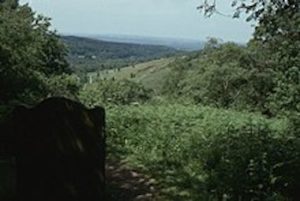
*This date in 1865 is remembered for the Devil’s Punchbowl episode, a post-American Civil War episode in Black history that occurred (or not) in Natchez (Adams County), Mississippi.
As Black slaves made their way to freedom, the town of Natchez quickly went from a population of 10,000 to nearly 100,000 people. To deal with the population influx of recently freedmen, a concentration camp was established by Union soldiers to eradicate the slaves essentially. Don Estes, former director of the Natchez City Cemetery, said. “So, they decided to build an encampment for ’em at Devil’s Punchbowl, which they walled off and wouldn’t let ’em out.”
The camp was called the Devil’s Punchbowl because of how the area was shaped. The camp was situated at the bottom of a deep, hollow pit with trees lining the bluffs above. The women and children were locked behind the concrete walls of the camp and left to die from starvation. Many also died from the smallpox disease. Over 20,000 freed slaves were killed in one year in this American concentration camp. Black men were recaptured by the Union troops and forced back into hard labor.
Researcher Paula Westbrook adds, "The Union Army did not allow them to remove the bodies from the camp. They just gave ’em shovels and said bury ’em where they drop.” Today, the bluffs are known for the wild peach groves, but the locals will not eat any fruit because some know what has fertilized the trees. Estes said that during his studies, he learned that women and children were all but left to die in the three “punchbowls.” “Disease broke out among ’em, smallpox being the main one. And thousands and thousands died. They were begging to get out. ‘Turn me loose, and I’ll go home back to the plantation! Anywhere but there.”
One researcher noted that skeletal remains continued to wash up when the Mississippi River at the Devil’s Punchbowl flooded the area. Yet there are other opinions on the truth of this episode.
“Natchez had a huge influx of self-emancipated enslaved persons, and the Union was not equipped to handle that, so they established refugee camps,” Ser Seshsh Ab Heter-Clifford M. Boxley, an activist and Natchez scholar. Boxley, a leading authority on the Devil’s Punchbowl, says many died in the crowded camps. Sanitation was substandard. Drinking from the Mississippi River could lead to disease or death. The administration of the newly occupied territory was haphazard at best.
But, he says, the deaths weren’t unique to Blacks. Union soldiers and white residents of the town also died during this time, albeit in smaller numbers. The story has sparked numerous debates among researchers, casting doubt on its accuracy.